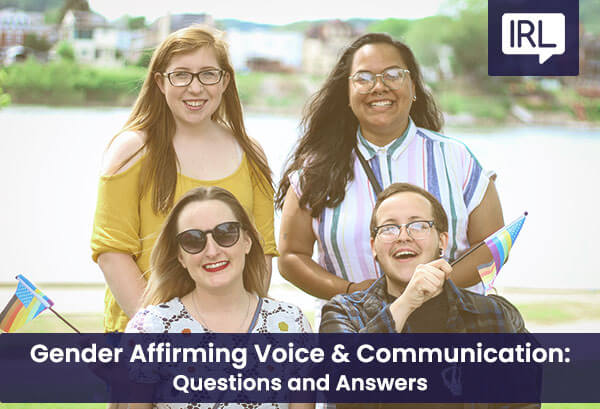Voice and communication are intimately connected to gender expression. Individuals across the gender spectrum, from transgender to non-binary to cisgender, may experience a disconnect between how their voice sounds and who they are as a person. Gender affirming voice and communication work helps individuals adjust their speech and voice production so that their communication matches their identity. This is work is both highly technical and highly personal, and there are lots of questions that people often have at the start of this journey. We sat down with Michelle Roberts, MSc, CCC-SLP to learn more about what happens during gender affirming voice development, from beginning to end!
What does “gender affirming voice services” refer to? Isn’t that just the same thing as voice masculinization and voice feminization?
The term “gender affirming” voice services acknowledges that gender identity and expression lie on a spectrum, and that not all people are necessarily looking to feminize or masculinize their voice. Oftentimes one or the other is a goal, but this term recognizes and is inclusive of all genders, including nonbinary individuals.
Are gender-affirming voice services only for transgender individuals who are in the process of transitioning?
These services are for anyone on the gender spectrum, including transgender and/or nonbinary individuals, who feel their voice and/or overall communication patterns do not align with their gender identity. It’s up to the person to decide at which point in their transition they’d like to pursue these services, but if someone is at the very beginning of their transition, I recommend they first receive some therapy with a gender therapist before starting voice and communication work.
What aspects of the voice and communication correspond with gender? Isn’t it just as simple as raising or lowering your pitch?
I love this question, because it is a very common misconception that pitch is the most important factor in influencing gender perception. There are so many other facets of voice and speech that come together that impact perception. Resonance (voice placement) + pitch are together the most important factors, according to research and also my own clinical experience. Intonation (pitch fluctuations marking emphasis), volume (voice loudness), articulation (speech sound precision), language (sentence structure, word choice, etc.) and non-verbal communication (gestures, body language, eye contact, etc) are also all areas that influence how a person’s gender is perceived, and are all areas that can be explored in this work.
How hard is it to change your voice? Learning to use a different pitch all the time sounds...difficult.
It’s definitely not easy! It’s a gradual process that takes a lot of commitment, patience, and self compassion.
On the other hand, there are a lot of YouTubers who give DIY tips for how to develop your authentic voice. Can I teach myself?
There are definitely a lot of resources online, including YouTube tutorials with great info and tips. It’s totally possible to do some exploration and research yourself and find a voice that feels and sounds more authentic. BUT - I will say, I have worked with several people who came to me after trying this and felt the techniques they learned weren’t easy or sustainable, and resulted in some physical strain and discomfort while speaking. Having the guidance of an experienced professional not only provides you with an individualized plan for your own voice and capabilities, it ensures the voice you’re developing is healthy and sustainable.
Will my voice permanently change as a result of learning these skills?
One of my clients recently described it perfectly. She said that all of the time spent working on your voice really becomes conditioned and memorized in a sense. With enough dedicated practice and time, it’s like training any other part of your body. It stays with you. The way your voice develops through this work becomes conditioned to muscle memory, and just like anything else that learns and develops, that information is retained. Anything you do with enough repetition becomes at least semi-permanent, and going back to anything else would take purposeful un-learning.
Is everyone able to achieve a voice they are happy with? What if I can’t find a voice that sounds right to me? How do people know when they have “found” their voice?
Although not everyone may find a voice that sounds absolutely perfect to them (but many do!), all have been able to develop a voice that feels authentic, sustainable, and more congruent with their gender identity. Goals for how your voice sounds may also change a bit the more you learn and the more you explore. Oftentimes further along the process I’ll hear someone say “I feel pretty good about my voice, but something still feels like it’s missing.” We’ll then do more exploration and work until they’re able to hear themselves and say “yep, that’s it.” Then it’s all about learning how to maintain it and access it with more spontaneity.
I’m a singer. Is it possible to change my singing voice as well?
Absolutely. I don’t specialize in the singing voice, but a lot of what we work on with the speaking voice carries over into singing spontaneously. I’m able to give some basic instruction in regards to ways to access a more authentic singing voice, but if a client wants further specialized singing training I’m always happy to refer to an affirming singing specialist.

